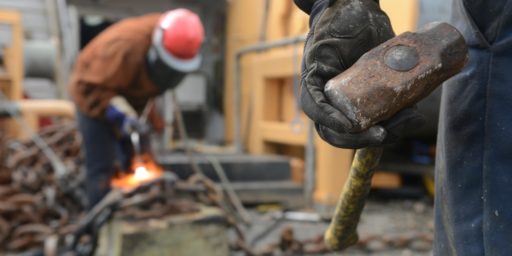GOOD NEWS FROM IRAQ
WaPo
features the following on page 1: “The water is our life,” Kerkush said as he gazed at the marsh that now comes within a few feet of his house and stretches as far as the eye can see. “It is a gift from God to have it back.”
A dozen years after Saddam Hussein ordered the vast marshes of southeastern Iraq drained, transforming idyllic wetlands into a barren moonscape to eliminate a hiding place for Shiite Muslim political opponents, Iraqi engineers have turned on the spigot again.
The flow is not what it once was — new dams have weakened the mighty Tigris and Euphrates rivers that feed the marshes — but the impact has been profound. As the blanket of water gradually expands, it is quickly nourishing plants, animals and a way of life for Marsh Arabs that Hussein had tried so assiduously to extinguish.
***
The marsh has once again assumed its omnipresent role in the village. Women clad in black head-to-toe abayas wade into the water to wash clothes. The mullet found in the murky depths, though small and bony, is grilled for dinner every night. Swamp grasses are cut to feed the cows and sheep that will eventually be traded for water buffalo.
“Everyone is so happy,” Kerkush said as he watched his son stand in a mashoof and steer it like a gondolier with a long wooden pole. “We are starting to live like we used to, not the way Saddam wanted us to live.” Best of all, this was simply free Iraqis taking the initiative, with an assist from the U.S.
In mid-April, a few days after Hussein’s government fell, Ali Shaheen returned to his job as director of the Irrigation Department in Nasiriyah. Located about 25 miles northwest of Zayad, Nasiriyah was the scene of some of the heaviest fighting during the war. But with the hostilities over and Shiites firmly in control of the local government, he decided to try to reverse the damage Hussein had wrought.
With a U.S. military escort, he drove to Garmat Bani Hassan, a town a mile away from Zayad. There, he ordered creaky metal gates on the Euphrates to be cranked open for the first time since 1991.
Shaheen, a short, balding civil engineer with a stubble-covered face, did the same thing with two other gates before embarking on a bigger engineering challenge — redirecting the Euphrates. He requisitioned several Irrigation Department bulldozers and smashed the dam Hussein had constructed to divert water to the Mother of All Battles River. For good measure, he had Hussein’s river blocked off with a mountain of dirt.
He had no orders to redirect the rivers. There was no functioning Irrigation Ministry at the time. But he assumed he was doing what the Marsh Arabs wanted.
“Drying the marshes was a crime,” said Shaheen, who joined the Irrigation Department in 1998, after the canals and dams were built. “I felt I needed to do whatever I could to restore what Saddam destroyed.”
Interesting. It’s going to take a whole lot of this kind of thing to turn Iraq into a vital country, let alone a thriving democracy. But one would imagine there are others like Shaheen.



